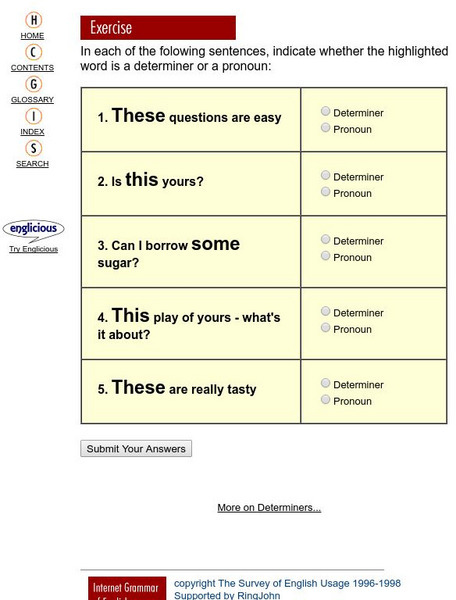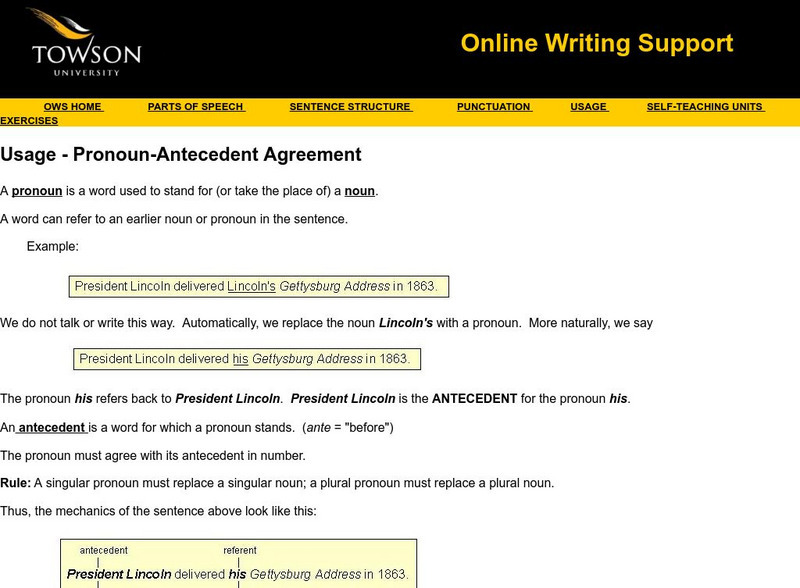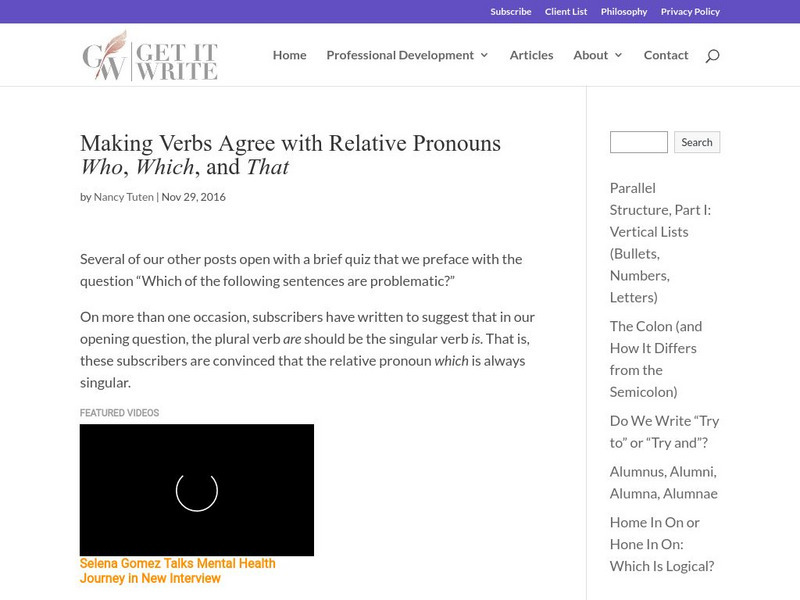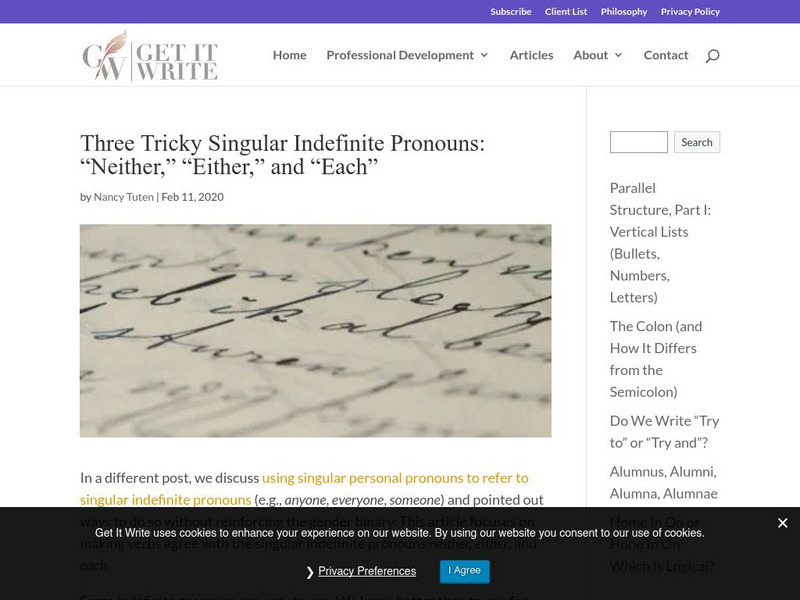Grammarly
Grammarly Blog: Possessive Pronouns: Rules and Examples
An explanation with examples of possessive pronouns and how they are used in sentences.
Grammarly
Grammarly Blog: Pronoun Reference
An explanation with examples of pronouns and how they are used in sentences.
Khan Academy
Khan Academy: Pronoun Antecedent Agreement
Test your knowledge on pronoun-antecedent agreement with this Khan Academy quiz. If you encounter a tricky problem, watch a video or request a hint!
University College London
University College London: Pronoun or Determiner?
Five sentence exercises for determining whether a bold word is used as a determiner or a pronoun. Answers are explained and followed up by link to more information. You may want to cursor up for a tutorial before the quiz. Browser must...
Sophia Learning
Sophia: Pronouns
Ten slides introducing pronouns, antecedents, and how they are used in first, second, and third person narration. Examples are provided through sentences and pronoun charts.
Robin L. Simmons
Grammar Bytes: Pronoun Reference
Printable information is provided that demonstrates how to recognize pronoun reference in the context of a sentence.
Grammarly
Grammarly Blog: Intensive Pronouns
An explanation with examples of intensive pronouns and how they are used in sentences, as well as how they differ from reflexive pronouns.
Capital Community College Foundation
Guide to Grammar and Writing: Consistency of Tense and Pronoun
Brief instruction on maintaining pronoun and verb tense consistency. Links to additional help and quiz are included.
Sophia Learning
Sophia: Unclear Pronoun References
A screencast lesson [4 mins, 18 secs] explaining unclear, ambiguous, vague, and indefinite pronouns as well as how to avoid them while writing.
Towson University
Towson University: Online Writing Support: Usage Pronoun Antecedent Agreement
This entry provides the nine rules for pronoun-antecedent agreement and examples for each.
Towson University
Towson University: Online Writing Support: Self Teaching Unit: Pronoun Case
This lesson focuses on pronoun case including subjective, objective, and possessive case. It provides examples of each and also discusses personal pronouns, reflexive / intensive pronouns, and the use of Who and Whom. It offers links to...
Towson University
Towson University: Ows: Pronoun Antecedent Agreement Exercise 3
This is a 10-question, self-grading exercise/quiz on Pronoun - Antecedent Agreement.
Grammarly
Grammarly Handbook: Reciprocal Pronouns
An explanation with examples of reciprocal pronouns and how they are used in sentences.
Get It Write
Get It Write: Reflexive Pronouns
In this tutorial leson, students will find a list of reflexive pronouns, examples of them in context, and explanations of when to use them. A short quiz is provided at the end of the lesson.
Get It Write
Get It Write: Making Verbs Agree With Relative Pronouns
A tutorial explaining that relative pronouns "that", "which", and "who" can be singular or plural, so be sure to check to be sure you are using the correct verb, singular or plural, in your sentence. A brief quiz checks your understanding.
Other
Grammar Monster: What Are Possessive Pronouns?
Get a better understanding of possessive pronouns with definitions, examples, lists, antecedents, and a five-question quiz.
Goodwill
Gcf Global: I, Me, and Other Pronouns
Learn the proper use of I, me, and other pronouns. Includes a chart that tells you which pronouns can replace subjects and which can replace objects.
Get It Write
Get It Write: Singular Indefinite Pronouns: Part 2
You'll find several examples in this tutorial of the correct singular verb form to be used with singular indefinite pronouns such as "everyone" and "either." A short quiz checks your understanding.
Get It Write
Get It Write: Singular Indefinite Personal Pronouns: Part I
A brief tutorial on the use of indefinite personal prounouns. Included is a list of third-person singular pronouns and a short quiz.
Other
Tidewater Community College: Writing Center: Pronoun Agreement
This site has information on guidelines for proper pronoun usage. Topics covered include agreement in person, number, and gender.
PBS
Pbs Learning Media: How to Use Intensive Pronouns
Intensive pronouns add needed emphasis to a sentence. While they function similarly to reflexive pronouns, they differ in that the pronoun can be removed without altering the meaning of the sentence. [0:57]
PBS
Pbs Learning Media: Reflexive Pronouns and Subjects
Reflexive pronouns reflect the subject of the sentence. A reflexive pronoun is a pronoun that is preceded or followed by the noun, adjective, adverb, or pronoun to which it refers within the same clause. [0:35]
PBS
Pbs Learning Media: Watch Out for Ambiguous Antecedents
A pronoun's antecedent must be clear. There may be more than one word the pronoun could refer to, and in those cases it may be better not to use the pronoun. [0:40]
Khan Academy
Khan Academy: Indefinite Pronouns
Which indefinite pronoun makes the most sense for each of these sentences?





















